
Aug 19
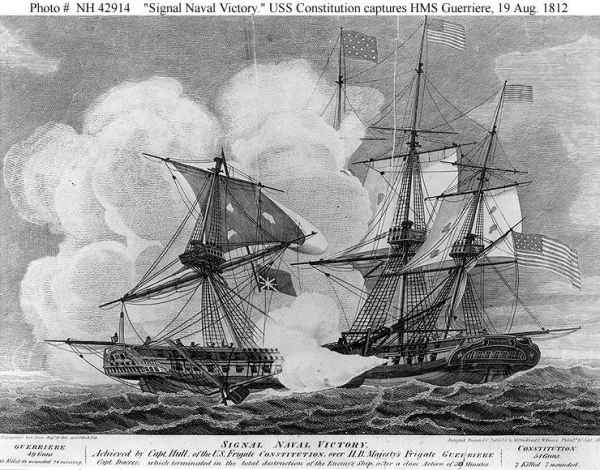
1812 USS Constitution again encounters HMS Guerriere, the same British frigate that had led the squadron that chased the Constitution back to Boston in July. This time, however, the 38-gun Guerriere is alone, and Constitution prevails in a hard-fought battle.
[See: Countdown to Infamy.]1818 Arriving off Cape Disappointment on the Columbia River, the USS Ontario claims both sides of the river for the United States.
1914 World War I: Various:
The British Expeditionary Force (BEF) lands in France:
The force got its nickname the 'Old Contemptibles' from a supposed 'Order of the Day' for 19 August 1914 issued by Kaiser Wilhelm: "It is my Royal and Imperial Command that you concentrate your energies for the immediate present upon one single purpose, and that is that you address all your skill and all the valour of my soldiers to exterminate first the treacherous English [and] walk over General French's contemptible little army"
The name stuck and the BEF proudly referred to themselves as the 'Old Contemptibles'. No evidence of such an order was ever found in the German archives after the war, and the ex-Kaiser denied having said it. "On the contrary, I continually emphasized the high value of the British Army, and often, indeed, in peace-time gave warning against underestimating it."
The order was, it seems, created by Frederick Maurice in the British War Office for propaganda purposes. (Reference: Nigel Rees citing Arthur Ponsonby, Falsehood in War-Time, 1928.) The last survivor of the BEF, Alfred Anderson, died in 2005.
President Wilson addresses Congress and makes public the US policy of neutrality:
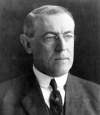
The effect of the war upon the United States will depend upon what American citizens say and do. Every man who really loves America will act and speak in the true spirit of neutrality, which is the spirit of impartiality and fairness and friendliness to all concerned.
The spirit of the nation in this critical matter will be determined largely by what individuals and society and those gathered in public meetings do and say, upon what newspapers and magazines contain, upon what ministers utter in their pulpits, and men proclaim as their opinions upon the street.
The people of the United States are drawn from many nations, and chiefly from the nations now at war. It is natural and inevitable that there should be the utmost variety of sympathy and desire among them with regard to the issues and circumstances of the conflict.
Some will wish one nation, others another, to succeed in the momentous struggle. It will be easy to excite passion and difficult to allay it. Those responsible for exciting it will assume a heavy responsibility, responsibility for no less a thing than that the people of the United States, whose love of their country and whose loyalty to its government should unite them as Americans all, bound in honour and affection to think first of her and her interests, may be divided in camps of hostile opinion, hot against each other, involved in the war itself in impulse and opinion if not in action.
1915 World War I: Various:
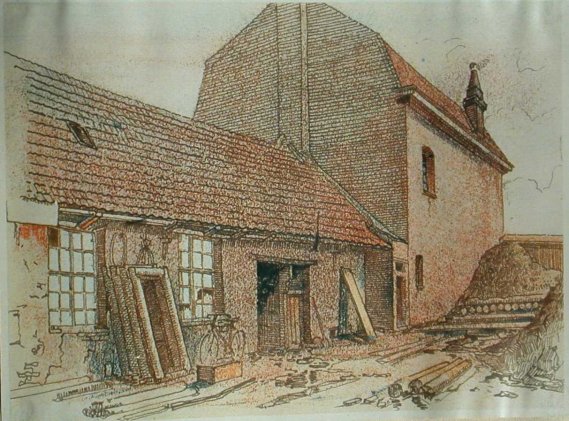
Fromelles Watercolor, 1915, by Hitler
List Regiment: Gefreiter Adolf Hitler's 16 Reserve Infantry Regiment occupy a position at Fromelles, on a level field with water channels, willow trees and willow stalks. In the distance towards the enemy lines lies an insignificant wood with barbed wire entanglements. Under the direction of their defense-minded commander, Lieutenant General Gustav Scanzoni von Lichtenfels, the regiment works ceaselessly day and night to further fortify their position at Fromelles while fighting off repeated assaults by the enemy. [For further details, Click here.]
War at Sea: The British liner Arabic is sunk, with the loss of two to four more American lives.
On 4-Feb-1915 the Germans began their first campaign of submarine warfare aimed at allied and neutral merchant vessels in the waters surrounding the UK. At this point the practice of allowing the crew to disembark before the vessel was sunk (usually by deck gun since torpedoes were conserved if at all possible) was still generally followed. A notorious exception to this rule was the Lusitania, a Cunard passenger liner that was sunk by U 20 under command of Captain Schweiger on 7-May-1915 off the coast of Ireland. 124 Americans were among the 1,198 casualties . . . . Three more Americans were killed when the U 24 sunk the passenger liner Arabic on 19-Aug-1915. The American government brought pressure to bear on Germany and demanded an end to sinking without warning. On 30-Aug-1915 Germany prohibits further action of this type. On 18-Sep-1915 the Germans, in an attempt to reduce further damage to American shipping, withdraw all U-boats from the English Channel area. U-boat activity would be at a lull for the next several months.
1916 World War I: List Regiment:
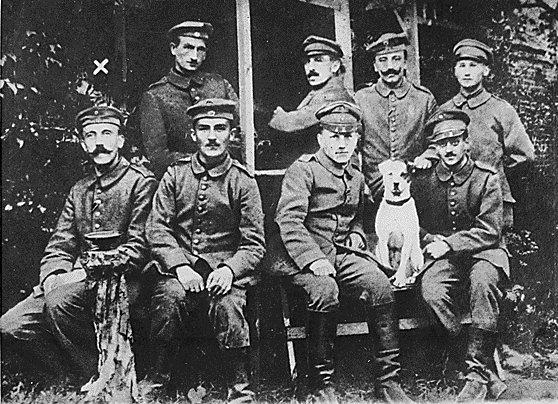
Gefreiter Adolf Hitler endures trench warfare in Flanders (Artois) with 3 Company, 16 Reserve Infantry Regiment. [For further details, Click here.]
1917 World War I: List Regiment (July 22-September 8):
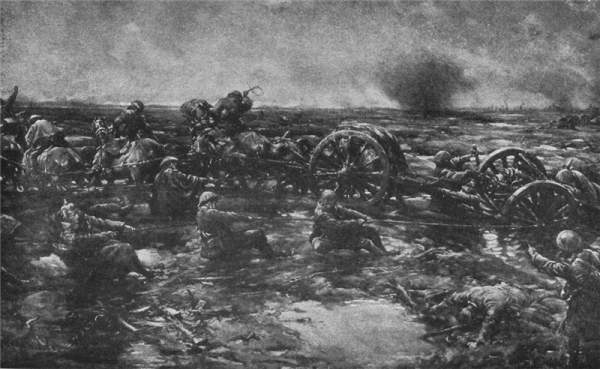
Dispatch Runner Gefreiter Adolf Hitler serves at the front with 3 Company, 16 Bavarian Reserve Infantry Regiment during Phase 2 operations in Flanders. Most of their time in the trenches gas masks are worn, while English bombers attack, and tanks—a new terror witnessed for the very first time by most—attempt to advance over a long front through seas of mud. [For further details, Click here.]
1918 World War I List Regiment (July 20-August 21): Gefreiter Adolf Hitler's 16th RIR is tasked with building a new line of defenses on the site of the failed Second Battle of the Marne. [For further details, Click here.]
1919 Various:
Versailles: President Wilson appears before the Senate Foreign Relations Committee:
On August 19, 1919, in a break with conventional practice, U.S. President Woodrow Wilson appears personally before the Senate Foreign Relations Committee to argue in favor of its ratification of the Versailles Treaty, the peace settlement that ended the First World War. [For further details, Click here.]
Statement by Herbert Hoover on Polish Infrastructure:
As a result of seven invasions by different armies the country has largely been denuded of buildings. The estates of the larger landowners have been destroyed, and while the peasants are cultivating approximately enough foodstuffs for their own supplies, these regions, which in normal times export large quantities of food, mostly from the large estates. are four-fifths uncultivated. In normal times the town populations exist by exchanging manufactured goods to the peasants and landowners for food. There has been virtually no import of manufactured goods for years, and the supplies of foodstuffs having vanished, the town populations are left entirely without support or employment. As there have been no manufactured goods to exchange, and as the currency no longer has any purchasing value in goods and the peasants do not care to exchange foodstuffs for it, there has been a total breakdown of the economic cycle. In addition to the destruction and robbery which accompanied the repeated invasion of rival armies, these areas have been, of course, through a cauldron of Bolshevist revolution and the intellectual classes either fled from the country or to a considerable extent were imprisoned. Some were executed. The Ruthenian peasants have been stirred up against the great landowners, which accounts for the destruction of the equipment of the large landed properties. It appears to us that it will require years for this region to recover, for animals must be provided, agricultural implements imported, and the whole agricultural production restarted.
1927 Weimar: Hitler attends the opening ceremonies of the Third Party Rally in Nuremberg: (Maser)
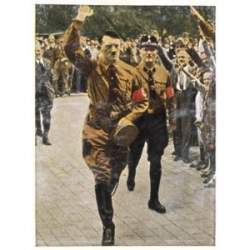
All National Socialists were proud that there was not a single conflict during the Nuremberg rally, despite the huge crowds. This is final proof of the fact that where National Socialism dominates the field, the German people's community becomes a reality. The Marxists, as long as they were solid German workers, gave up all their protests and did not following the incitement of their leaders-betrayers. Yes, many citizens of Nuremberg saw to their astonished pleasure that German workers of the mind and hand, many of whom were known to be Social Democrats, were apparently overcome by the impression of the Swastika army and put on badges with our swastika and eagle. In working class districts where a National Socialist hardly dared enter in 1920 or even 1922, swastika banners were hanging from the fourth and fifth floor windows. These German workers had wakened from the betrayal of Marxism, and we raised our hands to them in the hope that they will one day join us, just like the whole group of former Red Fronters who on Sunday, 21 August, put on Adolf Hitler's swastika arm band. (Alfred Rosenberg and Wilhelm Weiss, Reichsparteitag der NSDAP Nurnberg 19./21. August 1927, Munich: Verlag Frz. Eher, 1927.
1933 Various:
Mussolini meets with Dollfuss at the Italian-Austrian border:
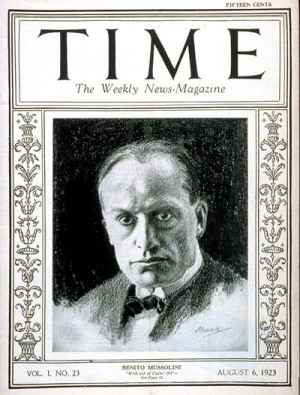
Austria's independence was immediately threatened when Hitler assumed power in Germany. He made it clear that expansion was his goal, with Austria's large German speaking population as the logical choice. But this did not sit well with Mussolini and his fascist government. In 1934, Austria was protected by Italy and its Chancellor, Engelbert Dollfuss, was a friend of Mussolini. Even if Austria was a small nation, it provided a buffer between the borders of Germany and Italy. To Mussolini, this border was to be maintained at all costs, and he vowed to protect Austria's independence with military force.
Mein Kampf: Houghton Mifflin Company of Boston publishes Hitler's Mein Kampf in English translation.
1934 Various:
Nazi Germany: Adolf Hitler becomes president:
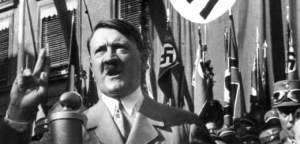
On this day in 1934, Adolf Hitler, already chancellor, is also elected president of Germany in an unprecedented consolidation of power in the short history of the republic.
In 1932, German President Paul von Hindenburg, old, tired, and a bit senile, had won re-election as president, but had lost a considerable portion of his right/conservative support to the Nazi Party. Those close to the president wanted a cozier relationship to Hitler and the Nazis. Hindenburg had contempt for the Nazis' lawlessness, but ultimately agreed to oust his chancellor, Heinrich Bruening, for Franz von Papen, who was willing to appease the Nazis by lifting the ban on Hitler's Brown Shirts and unilaterally canceling Germany's reparation payments, imposed by the Treaty of Versailles at the close of World War I.
But Hitler was not appeased. He wanted the chancellorship for himself. Papen's policies failed on another front: His authoritarian rule alienated his supporters, and he too was forced to resign. He then made common cause with Hitler, persuading President Hindenburg to appoint Hitler chancellor and himself vice-chancellor. He promised the president that he would restrain Hitler's worst tendencies and that a majority of the Cabinet would go to non-Nazis. As Hindenburg's current chancellor could no longer gain a majority in the Reichstag, and Hitler could bring together a larger swath of the masses and a unified right/conservative/nationalist coalition, the president gave in. In January 1933, Hitler was named chancellor of Germany.
But that was not enough for Hitler either. In February 1933, Hitler blamed a devastating Reichstag fire on the communists (its true cause remains a mystery) and convinced President Hindenburg to sign a decree suspending individual and civil liberties, a decree Hitler used to silence his political enemies with false arrests. Upon the death of Hindenburg in 1934, Hitler proceeded to purge the Brown Shirts (his storm troopers), the head of which, Ernst Roehm, had began voicing opposition to the Nazi Party's terror tactics. Hitler had Roehm executed without trial, which encouraged the army and other reactionary forces within the country to urge Hitler to further consolidate his power by merging the presidency and the chancellorship. This would make Hitler commander of the army as well. A plebiscite vote was held on August 19. Intimidation, and fear of the communists, brought Hitler a 90 percent majority. He was now, for all intents and purposes, dictator. (History.com)
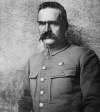
Poland: As Adolf Hitler assumes the title of Fuehrer, Polish strongman Pilsudski proposes a war against Germany by Poland and France before Hitler rearms.
1936 Various:
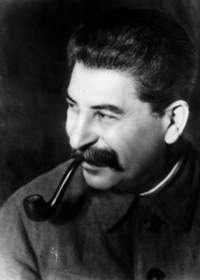
USSR: The first Stalinist trials of 'counterrevolutionaries' opens. All defendants are be sentenced to death, a judgment that is made even before the 'trial' begins.
Spanish Civil War: Spanish poet and playwright Federico Garcia Lorca is assassinated in Granada, Spain, by Franco's troops.
The executioner is reputed to have said "I fired two bullets into his arse for being a queer." Lorca was thrown into an unmarked grave somewhere between VÃznar and Alfacar, near Granada. There is a large controversy about the motives (personal non-political motives are also suggested) and details of his death. The dossier compiled at Franco's request has yet to surface.
1938 Various:
Holocaust: Swiss officials take measures to block Jewish refugees trying to enter Switzerland. (THP)
Prior to and during the Second World War, Switzerland gave refuge to about 23,000 Jewish refugees although the government decided that Switzerland would serve only as a country of transit. These Jews were protected during the Holocaust due to Swiss neutrality. The Jewish refugees, however, did not receive the financial support from the government that non-Jewish refugees received. Many more Jews were prevented from entering, effectively shutting the border. The Swiss government persuaded Germany to stamp "J" on the passport of Jews, making it easier to refuse Jewish refugees. The end of the war had delivered many thousands of Jews into the hands of the Nazis and their collaborators. In 1942, the Swiss police issued a regulation that denied refugee status to "refugees only on racial grounds, e.g., Jews." By the end of the war, less than 25,000 Jews were permitted to take refuge.
Law on asocial individuals: At a meeting of the German Committee for Public Care and Welfare Law, professors of medicine and law discuss with civil servants from the Ministry of the Interior the possibility of a "law on asocial individuals" that would allow people so defined to be sterilized or committed to concentration camps. According to later drafts of this law, which was never passed, two physicians and a police officer were to decide on the sterilization and further disposal of these individuals to concentration camps. (THP)
1939 Various:
From a letter from Arthur Seyss-Inquart to Himmler:

As far as my membership in the Party is concerned, I state that I was never asked to join the Party but had asked Dr. Kier in December 1931 to clarify my relationship with the Party, since I regarded the Party as the basis for the solution of the Austrian problem . . . . I paid my membership fees and, as I believe, directly to the Gau Vienna. These contributions also took place after the period of suppression. Later on I had direct contact with the Ortsgruppe in Dombach. My wife paid these fees, but the Blockleiter was never in doubt, considering that this amount, 40 shillings per month, was a share for my wife and myself, and I was in every respect treated as a Party member . . . . In every way, therefore, I felt as a Party member, considered myself a Party member, thus, as stated, as far back as December 1931.
Countdown to War: Orders to sail are issued to the German Navy. The pocket battleship Graf Spee is ordered to waters off Brazil, and her sister ship, Deutschland, is directed to the North Atlantic. (THP)
A telegram is received in Berlin from the German ambassador in Moscow:
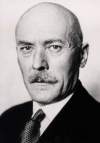
The Soviet Government agrees to the Reich Foreign Minister's coming to Moscow one week after proclamation of the signing of the economic agreement. Molotov stated that if the conclusion of the economic agreement is proclaimed tomorrow, the Reich Foreign Minister might arrive in Moscow on August 26 or 27. Molotov delivered to me a draft of a non-aggression pact. A detailed account of the two conversations I had with Molotov today, as well as the text of the Soviet draft [1 item down], follows by wire at once.
Molotov-Ribbentrop Pact:
The Government of the USSR and the German Government, desirous of strengthening the cause of peace among the nations and proceeding from the fundamental provisions of the Neutrality Agreement that was concluded in April 1926 between the U.S.S.R. and Germany, have reached the following accord:
ARTICLE 1. Both High Contracting Parties obligate themselves to desist reciprocally from any act of violence and any aggressive action whatsoever toward each other, or from an attack on each other either individually or jointly with other powers.
ARTICLE 2. Should one of the High Contracting Parties become the object of an act of violence or attack by a third power, the other High Contracting Party shall in no manner whatever give its support to such acts of that power.
ARTICLE 3. Should disputes or conflicts arise between the High Contracting Parties with regard to questions of one kind of another, both parties obligate themselves to settle these disputes and conflicts exclusively by peaceful means through mutual consultation or if necessary through the creation of suitable arbitration commissions.
ARTICLE 4. The present Treaty shall be concluded for a period of five years with the proviso that insofar as one of the High Contracting Parties does not denounce it one year before the expiration of the term the validity of the Treaty shall automatically be extended for another five years.
ARTICLE 5. The present Treaty shall be ratified in as short a time as possible, whereupon the Treaty shall enter into force. Postscript, The present Pact shall be valid only if a special protocol is signed simultaneously covering the points in which the High Contracting Parties are interested in the field of foreign policy. The protocol shall be an integral part of the Pact.
1940 World War II: Italian troops force the British to withdraw from Somaliland:
Godwin-Austen concluded that further resistance to the Italians would be futile in Tug Argan. He contacted the British Middle East Command headquarters in Cairo, Egypt. Godwin-Austen requested and received permission to withdraw his forces from British Somaliland. The determined effort of the Black Watch battalion, which covered the retreat, allowed the entire British and Commonwealth contingent to withdraw to Berbera with reduced losses . . . . On 19 August 1940, the Italians took control of Berbera and then moved down the coast to complete their conquest of British Somaliland. The British colony was annexed to Italian East Africa. British and Commonwealth losses in the short campaign were relatively low.
[See: How Did the Pact of Steel Effect Germany and Italy?]1941 Various:
Holocaust: The older Jewish children left in Byelaya Tserkov are loaded into three trucks, taken to the nearby rifle-range, and executed. Ninety of the younger children are held back in wretched conditions. (THP)
1941 Countdown to Infamy: From the Duty Book of Captain Shigeshi Uchida:
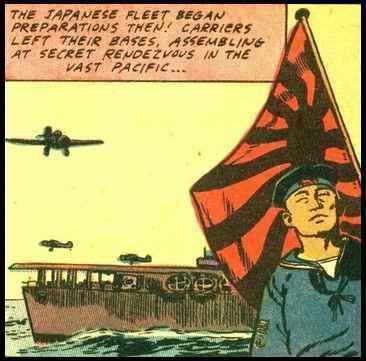
In the afternoon the air staff officers of the Combined Fleet (Sasaki) and the First Air Fleet (Genda), and the senior staff officer of the 11th Air Fleet (Captain Chihaya Takahashi), gathered in the operational room to discuss general matters (i.e., the overall air operations). (This of course includes the Southern Operations and Pearl Harbor.) (Dillon)
1942 World War II: Various:
Allies raid Dieppe:
An Allied force of 7,000 men carry out a large daytime raid against German positions at the French seaport of Dieppe. Aided by tanks and aircraft, the commando force--made up of approximately 5,000 Canadians, 2,000 British soldiers, and a handful of American and Free French troops--gained a foothold on the beach in the face of a furious German defense. During nine hours of fighting, the Allies failed to destroy more than a handful of their targets and suffered the death of 3,600 men. More than 100 aircraft, a destroyer, 33 landing craft, and 30 tanks were also lost. Despite its high costs, the Dieppe raid provided valuable logistical information later used in planning the successful 1944 Allied landing at Normandy. (History.com)
From an official memorandum of the Ministry for Occupied Eastern Territories:
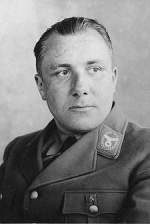
Martin Bormann: The Slavs are to work for us. In so far as we don't need them, they may die. They should not receive the benefits of the German public health system. We do not care about their fertility. They may practice abortion and use contraceptives; the more the better. We don't want them educated; it is enough if they can count up to 100. Such stooges will be the more useful to us. Religion we leave to them as a diversion. As to food, they will not get any more than is absolutely necessary. We are the masters; we come first.
FDR to Stalin:

I regret that I was unable to have been with you and Mr. Churchill in the conferences which have recently taken place in Moscow. The urgent needs of the military situation, especially insofar as the Soviet-German front is concerned, are well known to me. I am of the opinion that it will be difficult for the Japanese to dislodge us from the vantage point which we have gained in the area of the South-west Pacific. Although the naval losses of our forces were considerable in that area, the advantages which we have gained will justify them and I can assure you we are going to press them in a vigorous manner. I well realize on the other hand that the real enemy of both our countries is Germany and that at the earliest possible moment it will be necessary for both our countries to bring our power and forces to bear against Hitler. Just as soon as it is humanly possible to assemble transportation you may be sure this will be done. In the interim there will leave the United States for the Soviet Union during the month of August over 1,000 tanks, and at the same time other strategic materials are going forward, including aircraft. The fact that the Soviet Union is bearing the brunt of the fighting and losses during the year 1942 is well understood by the United States and I may state that we greatly admire the magnificent resistance which your country has exhibited. We are coming as quickly and as strongly to your assistance as we possibly can and I hope that you will believe me when I tell you this.
1943 World War II: Various:
FDR and Churchill to Stalin:
On August 15th the British Ambassador at Madrid reported that General Castellano had arrived from Badoglio . . . to say that Italy was willing to surrender unconditionally provided that she could join the Allies . . . . We are not prepared to enter into any bargain with Badoglio's Government to induce Italy to change sides; on the other hand there are many advantages and a great speeding of the campaign which might follow therefrom. We shall begin our invasion of the mainland of Italy probably before the end of this month and about a week later we shall make our full-scale thrust at 'Avalanche.' It is very likely that Badoglio's Government will not last so long. The Germans have one or more armored divisions outside Rome and once they think that the Badoglio Government is playing them false, they are quite capable of overthrowing it. We are very desirous of emphasizing to you again the importance of our all three meeting.
Holocaust: Treblinka receives its last trainload of deportees, a transport from the Bialystok ghetto.
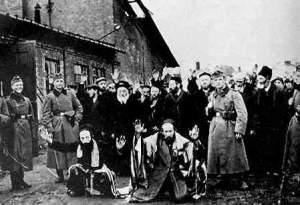
When I came to Treblinka the camp commandant was a doctor named Dr. Eberl. He was very ambitious. It was said that he ordered more transports than could be "processed" in the camp. That meant that trains had to wait outside the camp because the occupants of the previous transport had not yet all been killed. At the time it was very hot and as a result of the long wait inside the transport trains in the intense heat many people died. At the time whole mountains of bodies lay on the platform. The Hauptsturmfuehrer Christian Wirth came to Treblinka and kicked up a terrific row. And then one day Dr. Eberl was no longer there. (Willi Mentz quoted in The Good Old Days - E. Klee, W. Dressen, V. Riess, The Free Press, NY, 1988, p. 245-247) (accessed 14.08.09)
Church & Reich: A joint pastoral letter from the German bishops reminds the faithful that the killing of innocents is wrong even if done by the authorities and allegedly for the common good, as in the case of "men of foreign races and descent." The bishops call for love of "those innocent humans who are not of our people and blood," and of "the resettled." (Neither the word "Jew" nor "non-Aryan" is used. (THP)
1944 World War II Various:
Liberation of Paris: Paris rises against German occupation with the help of Allied troops. General Eisenhower changes his mind and decides not to bypass Paris after receiving word of an uprising in the city. He orders in the Second Free French Armored Division, supported by US troops.
Death: Guenther von Kluge: German field marshal. Von Kluge was somewhat involved in the military resistance. He knew about von Tresckow's plan to shoot Hitler during a visit to Army Group Center. He had been informed by his former subordinate, Georg von Boeselager, who was now serving under von Tresckow. von Kluge, however, refused to provide any support to the conspirators of the July 20 plot as soon as he found out that Hitler had survived Stauffenberg's assassination attempt. He was recalled to Berlin for a meeting with Hitler after Stauffenberg's failed coup; thinking that Hitler would punish him as a conspirator, he committed suicide by taking cyanide on the plane to Berlin. He left Hitler a letter in which he advised Hitler to make peace and "put an end to a hopeless struggle when necessary . . . . " Hitler reportedly handed the letter to Alfred Jodl and commented that "There are strong reasons to suspect that had not Kluge committed suicide he would have been arrested anyway."
Normandy: Polish 1st Armored Division links up with Americans, closing the Falaise Gap and trapping many German soldiers.
1945 Indochina: During the August Revolution against French colonial rule, the Viet Minh under Ho Chi Minh took control of Hanoi in northern Vietnam. [For further information, click here.]
1946 Nuremberg Tribunal: Two Hundred and Sixth Day.
Dr. Merkel (Counsel for the Gestapo): I shall then have only one collective affidavit left. If the Tribunal wishes me to do so, I can read the summary contained in that affidavit; as far as I know, that has not been translated. There are six pages of this summary of 1,276 individual affidavits which do not appear in the Commission report.
The President: Yes, go on.
Dr. Merkel: Regarding the question of compulsory membership, 665 affidavits are available. They state that when the Gestapo was created, the requirements for personnel were for the most part met out of the existing Political Police. Regarding forced membership of emergency draftees, there are 127 affidavits which deal with the same subject.
785 affidavits state that they had no knowledge of the crimes of which the Gestapo is being accused.
39 affidavits deal with the difference in organization between the Gestapo in the Reich and the Security Police in occupied territories.
195 affidavits state that the writers had no knowledge of inhuman treatment and atrocities in the concentration camps. A few ,officials who had entered concentration camps on conducted visits failed to notice any irregularities there; nor did released detainees speak about concentration camps in a derogatory manner.
133 affidavits state that no p9rticipation or supervision of the excesses of 9 and 10 November had taken place.
67 affidavits state that the looting of private or state property was expressly forbidden to members of the Gestapo.
135 affidavits state that a large number of Gestapo members knew nothing about the existence of the Einsatzgruppen or of atrocities committed by them.
218 affidavits state that the "Bullet Decree" was unknown to the majority of the Gestapo officials, and that recaptured prisoners of war were turned over to Wehrmacht offices.
168 affidavits state that enemy parachutists were turned over to the Air Force by the Gestapo, and 23 affidavits state that the Reich Security Main Office was responsible for the imposition of protective custody.
181 affidavits speak of punishment of members of the Gestapo by SS and Police Courts for misconduct during, and off duty.
1947 The Doctors Trial: The judges of the American military tribunal in the case of the USA vs. Karl Brandt et al. confront the difficult question of medical experimentation on human beings. Several of the doctors had argued in their own defense that their experiments had differed little from previous American or German experiments. Furthermore they showed that no international law or informal statement differentiated between legal and illegal human experimentation. Note: Before announcing their verdict, the judges reiterated almost all of the points in Dr. Alexander's memorandum of April 17 in a section entitled "Permissible Medical Experiments," which revised his original six points into ten. Subsequently, these ten points became known as the "Nuremberg Code." Although the code addressed the defense arguments in general, remarkably none of the specific findings against Brandt and his codefendants mentioned the code. Thus the legal force of the document was not well established and failed to find a place in either the American or German national law codes. Nevertheless, it remains a landmark document on medical ethics and one of the most lasting products of the 'Doctors Trial.'
1953 CIA-assisted coup overthrows government of Iran:
The Iranian military, with the support and financial assistance of the United States government, overthrows the government of Premier Mohammed Mosaddeq and reinstates the Shah of Iran. Iran remained a solid Cold War ally of the United States until a revolution ended the Shah's rule in 1979. [For further details, Click here.]
1980 Death: Otto Frank: German writer and father of Anne Frank.
1989 Hungary opens its border with Austria as part of the Pan-European Picnic, allowing several hundred East Germans to defect to the West. [For further information, click here.]
Edited by Levi Bookin (Copy editor)
levi.bookin@gmail.com



Click to join 3rdReichStudies



Disclaimer: This site includes diverse and controversial materials--such as excerpts from the writings of racists and anti-Semites--so that its readers can learn the nature and extent of hate and anti-Semitic discourse. It is our sincere belief that only the informed citizen can prevail over the ignorance of Racialist "thought." Far from approving these writings, this site condemns racism in all of its forms and manifestations.
Fair Use Notice: This site may contain copyrighted material the use of which has not always been specifically authorized by the copyright owner. We are making such material available in our efforts to advance understanding of historical, political, human rights, economic, democracy, scientific, environmental, and social justice issues, etc. We believe this constitutes a "fair use" of any such copyrighted material as provided for in section 107 of the US Copyright Law. In accordance with Title 17 U.S.C. Section 107, the material on this site is distributed without profit to those who have expressed a prior interest in receiving the included information for research and educational purposes. If you wish to use copyrighted material from this site for purposes of your own that go beyond 'fair use', you must obtain permission from the copyright owner.
Please Note: The list-owner and moderators of 3rdReichStudies are not responsible for, and do not necessarily approve of, the random ads placed on our pages by our web server. They are, unfortunately, the price one pays for a 'free' website.